- Home
- Jojo Moyes
Paris for One and Other Stories
Paris for One and Other Stories Read online
ALSO BY JOJO MOYES
After You
One Plus One
The Girl You Left Behind
Me Before You
The Last Letter from Your Lover
The Ship of Brides
Silver Bay
VIKING
An imprint of Penguin Random House LLC
375 Hudson Street
New York, New York 10014
penguin.com
A Pamela Dorman Book / Viking
Copyright (c) 2016 by Jojo's Mojo Limited Penguin supports copyright. Copyright fuels creativity, encourages diverse voices, promotes free speech, and creates a vibrant culture. Thank you for buying an authorized edition of this book and for complying with copyright laws by not reproducing, scanning, or distributing any part of it in any form without permission. You are supporting writers and allowing Penguin to continue to publish books for every reader.
Paris for One was published by Penguin Books Ltd, London.
"Last Year's Coat," "A Bird in the Hand," "Thirteen Days with John C," "Crocodile Shoes," and "The Christmas List" first appeared in Woman & Home.
"Between the Tweets," "Love in the Afternoon," and "Holdups" were read on BBC broadcasts.
Here: Martin M303 / Shutterstock.com Here: Howard Kingsnorth / Getty Images Here: Edward Olive / Arcangel Here: stockstudioX / Getty Images Here: Deborah Pendell / Arcangel Here: dotshock / Shutterstock.com Here: Yasuno Sakata / Getty Images Here: Lev Dolgachov / Alamy Stock Photo Here: Laura Evans / Arcangel ISBN 9780735221079 (hardcover)
ISBN 9780735221192 (e-book)
This is a work of fiction. Names, characters, places, and incidents either are the product of the author's imagination or are used fictitiously, and any resemblance to actual persons, living or dead, businesses, companies, events, or locales is entirely coincidental
Version_1
For my mother, Lizzie Sanders
Contents
Also by Jojo Moyes
Title Page
Copyright
Dedication
Paris for One
Between the Tweets
Love in the Afternoon
A Bird in the Hand
Crocodile Shoes
Holdups
Last Year's Coat
Thirteen Days with John C
The Christmas List
About the Author
Paris for One
Chapter One
Nell shifts her bag along the plastic seating in the station and checks the clock on the wall for the eighty-ninth time. Her gaze flicks back as the door from Security slides open. Another family--clearly Disney bound--walks through into the departure lounge, with baby stroller, screaming children, and parents who have been awake way too long.
For the last half hour, her heart has been thumping, a sick feeling high in her chest.
"He will come. He will still come. He can still make it," she mutters under her breath.
"Train 9051 to Paris will be leaving from Platform Two in ten minutes. Please make your way to the platform. Remember to take all luggage with you."
She chews her lip, then texts him again--the fifth time.
Where are you? Train about to leave!
She had texted him twice as she set off, checking that they were still meeting at the station. When he didn't answer, she told herself it was because she had been on the Underground. Or he had. She sends a third text, and a fourth. And then, as she stands there, her phone vibrates in her hand and she almost buckles with relief.
Sorry, babe. Stuck at work. Not going to make it.
As if they had planned to catch up over a quick drink. She stares at the phone in disbelief.
Not going to make this train? Shall I wait?
And, seconds later, the reply:
No, you go. Will try for later train.
She is too shocked to be angry. She stands still as people get to their feet around her, pulling on coats, and punches out a reply.
But where will we meet?
He doesn't answer. Stuck at work. It's a surf-and scuba-wear shop. In November. How stuck can he be?
She gazes around her, as if this might still be a joke. As if he will, even now, burst through the doors with his broad smile, telling her that he was teasing her (he is a bit too fond of teasing her). And he will take her arm, kiss her cheek with wind-chilled lips, and say something like, "You didn't think I'd miss this, did you? Your first trip to Paris?"
But the glass doors stay firmly shut.
"Madam? You need to go to the platform." The Eurostar guard reaches for her ticket. And for a second she hesitates--will he come?--and then she is in the crowd, her little wheeled case trailing behind her. She stops and types:
Meet me at the hotel, then.
She heads down the escalator as the huge train roars into the station.
"What do you mean, you're not coming? We've planned this for ages." It is the annual Girls' Trip to Brighton. They have traveled there on the first weekend of November every year for six years--Nell, Magda, Trish, and Sue--piled into Sue's old four-wheel drive or Magda's company car. They would escape their daily lives for two nights of drinking, hanging out with the lads from stag weekends, and nursing hangovers over cooked breakfasts in a tatty hotel called Brightsea Lodge, its outside cracked and faded, the scent of its interior suffused with decades of drink and cheap aftershave.
The annual trip has survived two babies, one divorce, and a case of shingles (they spent the first night partying in Magda's hotel room instead). Nobody has ever missed one.
"Well, Pete's invited me to go to Paris."
"Pete is taking you to Paris?" Magda had stared at her as if she'd announced she was learning to speak Russian. "Pete Pete?"
"He says he can't believe I've never been."
"I went to Paris once, on a school trip. I got lost in the Louvre, and someone put my sneaker down a toilet in the youth hostel," said Trish.
"I snogged a French boy because he looked like that bloke who goes out with Halle Berry. Turned out he was actually German."
"Pete-with-the-hair Pete? Your Pete? I'm not trying to be mean. I just thought he was a bit of a . . ."
"Loser," said Sue helpfully.
"Knob."
"Prat."
"Obviously we're wrong. Turns out he's the kind of bloke who takes Nell on romantic weekends to Paris. Which is . . . you know. Great. I just wish it wasn't the same long weekend as our long weekend."
"Well, once we'd got the tickets . . . it was difficult . . ." Nell mumbled with a wave of her hand, hoping nobody would ask who had actually purchased these tickets. (It had been the only weekend left before Christmas when the discount had applied.)
She had planned the trip as carefully as she organized her office paperwork. She had searched the Internet for the best places to go, scanning TripAdvisor for the best budget hotels, cross-checking each one on Google, and entering the results on a spreadsheet.
She had settled on a place behind the rue de Rivoli--"clean, friendly, very romantic"--and booked an "executive double room" for two nights. She pictured herself and Pete tangled up in a French hotel bed, gazing out the window at the Eiffel Tower, holding hands over croissants and coffee in some street cafe. She was only really going on pictures: she didn't have much idea what you did on a weekend in Paris, apart from the obvious.
At the age of twenty-six, Nell Simmons had never been away for a weekend with a boyfriend, unless you counted that time she went rock-climbing with Andrew Dinsmore. He had made them sleep in his Mini, and she woke up so cold that she couldn't move her neck for six hours.
Nell's mother, Lilian, was fond of telling anyone w
ho would listen that Nell "was not the adventurous type." She was also "not the type to travel," "not the kind of girl who can rely on her looks," and now, occasionally, if her mother thought Nell was out of earshot, "no spring chicken."
That was the thing about growing up in a small town--everyone thought they knew exactly what you were. Nell was the sensible one. The quiet one. The one who would carefully research any plan and who could be trusted to water your plants, mind your kids, and not run off with anyone's husband.
No, Mother. What I really am, Nell thought as she printed off the tickets, gazing at them, then tucking them into a folder with all the important information, is the kind of girl who goes to Paris for the weekend.
As the big day grew nearer, she started to enjoy dropping it into conversation. "Got to make sure my passport is up-to-date," she said when she left her mother after Sunday lunch. She bought new underwear, shaved her legs, painted her toenails a vivid shade of red (she usually went for clear). "Don't forget I'm leaving early on Friday," she said at work. "You know. For Paris."
"Oh, you're so lucky," chorused the girls in Accounts.
"I'm well jell," said Trish, who disliked Pete slightly less than everyone else.
Nell climbs onto the train and stows her bag, wondering how "jell" Trish would be if she could see her now: a girl beside an empty seat going to Paris with no idea whether her boyfriend was even going to turn up.
Chapter Two
The Gare du Nord in Paris is teeming. She emerges through the platform gates and is frozen to the spot, standing in the middle of crowds of people, all pushing and shoving, wheeled cases crashing into her shins. Groups of youths in tracksuit tops stare sullenly from the sidelines, and she remembers suddenly that the Gare du Nord is the pickpocketing epicenter of France. Her handbag clamped to her side, she walks tentatively in one direction and then the other, temporarily lost among the glass kiosks and escalators that seem to lead nowhere.
A three-note chime sounds on the loudspeaker, and the station announcer says something in French that Nell can't understand. Everyone else is walking briskly, as if they know where they're going. It is dark outside, and she feels panic rising like a bubble in her chest. I'm in a strange city, and I don't even speak the language. And then she sees the suspended sign: TAXIS.
The queue is fifty people long, but she doesn't care. She scrabbles in her bag for the hotel printout, and when she finally reaches the front of the queue, she holds it out. "Hotel Bonne Ville," she says. "Um . . . s'il vous plait."
The driver looks back at her as if he cannot understand what she says.
"Hotel Bonne Ville," she says, trying to sound French (she had practiced at home in front of the mirror). She tries again. "Bonne Ville."
He looks blank and snatches the piece of paper from her. He stares at it for a moment.
"Ah! Hotel Bonne Ville!" he says, lifting his eyes to heaven. He thrusts the piece of paper back at her and pulls into the heavy traffic.
Nell sits back in the seat and lets out a long breath.
And . . . welcome to Paris.
The journey, hobbled by traffic, takes twenty long, expensive minutes. She gazes out the window at the busy streets, the hairdressers and nail bars, repeating the French road signs under her breath. The elegant gray buildings rise high into the city sky, and the coffee shops glow in the winter night. Paris, she thinks, and with a sudden, unexpected surge of excitement, she feels suddenly that it will be okay. Pete will come later. She will be waiting for him at the hotel, and tomorrow they will laugh at how worried she was about traveling alone. He always said she was too much of a worrier.
Chill out, babe, he will say. Pete never got stressed about anything. He'd traveled the world with his backpack and still carried his passport in his pocket--"just in case." When he'd been held up at gunpoint in Laos, he said, he'd just chilled. "No point getting stressed about it. Either they were going to shoot me or they weren't. Nothing I could do about it." Then he nodded. "We ended up going for a beer with those guys."
Or there was the time when he was on a small ferry in Kenya, which overturned, mid-river. "We just cut the tires off the sides of the boat and hung on till help came. I was pretty chill about that, too--till they told me there were crocodiles in the water."
She sometimes wondered why Pete, with his tanned features and his endless life experiences (even if the girls sniffed at them), had chosen her. She wasn't flashy or wild. In fact, she had barely been beyond her own postcode. He once told her he liked her because she didn't give him a hard time. "Other girlfriends are like this in my ear." He mimed a yapping motion with his hand. "You . . . well, you're relaxing to be with."
Nell occasionally wondered if this made her sound a bit like a Furniture Warehouse sofa, but it was probably best not to question these things too hard.
Paris.
She lowers the window, taking in the sounds of the busy streets, the scent of perfume, coffee, and smoke, the breeze catching and lifting her hair. It is just as she'd pictured it. The buildings are tall, with long windows and little balconies--there are no office blocks. Every street corner seems to have a cafe with round tables and chairs outside. And as the taxi heads farther into the city, the women look more stylish and people are greeting each other with kisses as they stop on the pavement.
I'm actually here, she thinks. And suddenly she is grateful that she has a couple of hours to freshen up before Pete arrives. For once she does not want to be the wide-eyed innocent.
I'm going to be Parisian, she tells herself, and sinks back in her seat.
The hotel is in a narrow street off a main boulevard. She counts out the euros according to the sum on the taxi's meter and hands them to the driver. But instead of taking the money, the driver acts as if she has insulted him, waving toward her suitcase in the boot, grimacing and gesticulating.
"I'm sorry. I don't understand," she says.
"La valise!" he yells. And follows up with something else in rapid-fire French that she cannot understand.
"The guide said this journey should be thirty euros max. I looked it up."
More yelling and gesticulating. After a pause she nods, as if she has understood, then anxiously thrusts another ten euros at him. He takes the money, shakes his head, then dumps her suitcase on the pavement. She stands there as he drives off and wonders if she has just been ripped off.
But the hotel looks nice. And she's here! In Paris! She decides that she will not let anything upset her. She walks in and finds herself in a narrow lobby infused with the scents of beeswax and something else that she decides is indefinably French. The walls are paneled wood, the armchairs old but elegant. All the door handles are brass. Already she's wondering what Pete will think of it. Not bad, he will say, nodding. Not bad, babe.
"Hello," she says, nervous, and then, because she has no idea how to say it in French, "Parlez anglais? I have booked a room."
Another woman has arrived behind her, huffing and puffing as she scrabbles in her bag for her own paperwork.
"Yeah. I have a room booked, too." She slaps her own paperwork on the desk beside Nell's. Nell shifts to the side and tries not to feel crowded.
"Ugh. I have had a nightmare getting here. A nightmare." The woman is American. "Paris traffic is the pits."
The receptionist is in her forties, with short, well-cut black hair in a Louise Brooks bob. She glances up at the two women with a frown. "You both have bookings?"
She leans forward and examines the bits of paper. Then she pushes each one toward its owner. "But I have only one room left. We are fully booked."
"That's impossible. You confirmed the booking." The American woman pushes the paper back at her. "I booked it last week."
"So did I," says Nell. "I booked mine two weeks ago. Look, you can see on my printout."
The two women stare at each other, suddenly aware that they are in competition.
"I am sorry. I do not know how you each have this booking. We have only one room." The Frenchw
oman manages to make it sound as if it is their fault.
"Well, you will have to find us another room," says the woman. "You must honor the bookings. Look, there they are in black and white."
The Frenchwoman lifts a perfectly plucked eyebrow. "Madame. I cannot give you what I do not have. There is one room, with twin beds. I can offer one of you a refund, but I do not have two rooms."
"But I can't go anywhere else. I'm meant to be meeting someone," says Nell. "He won't know where I am."
"I'm not moving," says the American, folding her arms. "I have just flown six thousand miles, and I have a dinner to go to. I have no time to find somewhere else."
"Then you may share the room. I can offer each of you a discount of fifty percent."
"Share a room with a stranger? You have got to be kidding me," says the American.
"Then I suggest you find another hotel," says the receptionist coolly, and she turns to answer a telephone.
Nell and the American woman stare at each other. The American woman says, "I have just gotten off a flight from Chicago."
Nell says, "I've never been to Paris before. I don't know where I would find another hotel."
Neither of them moves. Nell says finally, "Look--my boyfriend is going to be meeting me here. We could both take our cases up for now, and when he arrives, I'll see if he can find us another hotel. He knows Paris better than I do."
The American woman looks her up and down slowly, as if working out whether to trust her. "I'm not sharing with two of you."
Nell holds her gaze. "Believe me, that is not my idea of a fun weekend away either."
"I don't suppose we have a lot of choice," the woman says. "I can't believe this is happening."
They inform the receptionist of their plan, the American woman with disproportionate irritation, Nell thinks, considering that Nell has basically just given her the room. "And when this lady leaves, I still want my fifty percent discount," the woman is saying. "This whole thing is shameful. You would never get away with service like this where I come from."
Nell wonders if she has ever been more uncomfortable, trapped between the Frenchwoman's lack of interest and the American's boiling resentment. She tries to imagine what Pete would do. He would laugh, take it all in his stride. His ability to laugh at life is one of the things she finds attractive about him. It's fine, she tells herself. They will joke about this later.

 Me Before You
Me Before You After You
After You The Last Letter From Your Lover
The Last Letter From Your Lover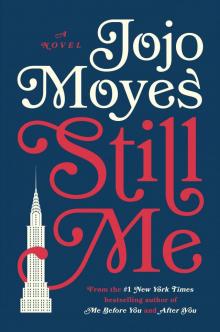 Still Me
Still Me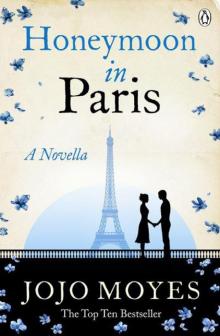 Honeymoon in Paris
Honeymoon in Paris Night Music
Night Music The Girl You Left Behind
The Girl You Left Behind Windfallen
Windfallen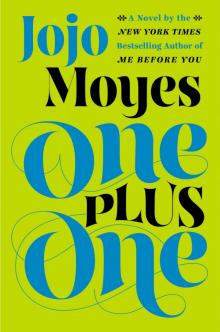 One Plus One
One Plus One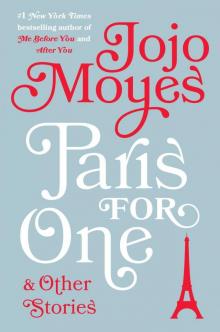 Paris for One and Other Stories
Paris for One and Other Stories The Giver of Stars
The Giver of Stars The Ship of Brides
The Ship of Brides The Peacock Emporium
The Peacock Emporium Silver Bay
Silver Bay The Horse Dancer
The Horse Dancer Peacock Emporium
Peacock Emporium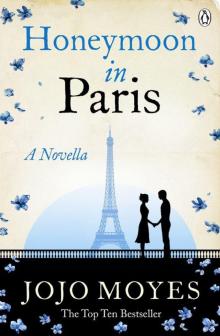 Honeymoon in Paris: A Novella
Honeymoon in Paris: A Novella Ship of Brides
Ship of Brides Paris For One (Quick Reads)
Paris For One (Quick Reads)